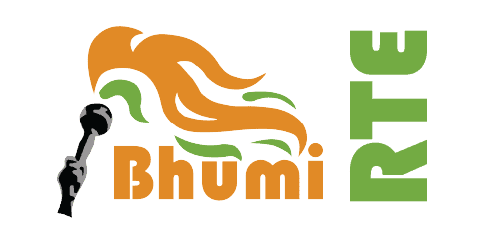RTE 12 1 C - Introduction
The Right of Children to Free and Compulsory Education (RTE) Act, 2009 mandates a minimum reservation of 25% seats in entry-level classes (LKG and Grade 1) of private, unaided non- minority schools for children belonging to Disadvantaged Groups (DG), Weaker Sections (WS) and Disadvantaged Special Groups (DGS). This provision promotes inclusion and diversity in classrooms. Children between the age of 3 and 4 can apply for L.K.G and between the age of 5 and 6 can apply for Grade 1 classes.
The intention behind this provision is to ensure all stakeholders share the obligation of guaranteeing free and compulsory education to children. This Section is also the only provision in the RTE Act which talks about social integration at the school level and attempts to convert educational institutions into inclusive spaces. Such inclusive schools will ensure every child brings something different to the table, hence enriching the school community and creating a more democratic learning environment.
Recent studies on the effects of the RTE act suggest benefits for both sets of students. On one hand, fee-paying children studying in heterogeneous classrooms (where there are children from different economic and social backgrounds) are more likely to volunteer for nation-building compared to their friends’ inhomogeneous classrooms.
On the other hand, 25% of disadvantaged children have shown significant gains in self-efficacy, which is a belief in one’s ability to succeed. The key findings of the recent study by Vijay Kumar Damera, 2018, Essays on School Choice: Empirical Evidence from Implementation of India’s National School Choice Policy are that the policy has a positive effect on self-efficacy, particularly for girls. In a study conducted for 1.5 years in Karnataka on a sample of 1616 students, it was noted that girls gained more out of RTE 12(1)(c) than boys.
Studies have also established the fact that diverse classrooms which Section 12(1)(c) strives to bring about, results in the better academic achievement of children and leads to friendships that overlook barriers of caste, class, gender and sexuality, making them more empathetic.
| Academic Year | Total no. of seats available | Total no. of students admitted | Seats fill Rate |
| 2018-19 | 1,27,137 | 63,309 | 49% |
| 2019-20 | 1,24,350 | 73,504 | 59% |
| 2020-21 | 1,15,708 | 70,801 | 61% |
| 2021-22 | 1,08,978 | 56,166 | 51% |
Across TN, out of 1.08 lakh seats available in a total of 8437 private schools under the Right to Education Act (RTE), only 51% of the seats have been filled in the last academic year (2021-22).
Weaker Section: For all sections of people with an annual income of less than Rs. 2 lakhs can apply under the Weaker section. To avail this, parents should get Income certificate from respective Tahsildar.
Disadvantaged Group (DG): Children applying under the Disadvantaged category, should belong to any one of the below-mentioned sections.
- Backward Class (BC)
- Most Backward Class (MBC)
- Scheduled Community (SC)
- Scheduled Tribes (ST)
Disadvantaged Special Category (DG-Spl): Children applying under Disadvantaged Special Category, should belong to any one of the below-mentioned sections.
- Orphan
- HIV affected Children
- Transgender
- Child of a Scavenger
- Differently-Abled Child
The public must submit the following documents to apply for enrollment of a child in free education through the Right to Education Act (RTE).
A). Birth certificate of the child
B). Income certificate
e ). Caste certificate
D). Address proof.
Even if you do not have any of the above documents, you should apply and keep it ready as soon as possible before starting the online application.
Address Proof:
As per G.O 60 of School Education Department Dated. 01.04.2013, to prove habitation, the applicant should upload any one of the below-mentioned address proof,
- Family Card
- Voter ID
- Aadhar ID
- Driving License
- Bank Pass Book
- Telephone Bill
- PAN card
- Certificate of residence issued by VAO
- ID card issued by the State Govt./ Central Govt. / Public sector undertakings.
Income Certificate: Tahsildar, Revenue Department – Government of Tamilnadu.
Community certificate for BC, MBC, Denotified Community: Deputy Tahsildar, Revenue Department – Government of Tamilnadu.
Community Certificate for SC: Tahsildar, Revenue Department -Government of Tamilnadu /Competent authority in the case of children coming from other states.
Community Certificate for ST: RDO/Sub Collector, Revenue Department – Government of Tamilnadu/Competent authority in the case of children coming from other states.
Certificate for Orphan: District Social Welfare Officer, Department of Social Welfare and Nutritious Meal Programme.
Certificate for HIV / Transgender: Medical Officer authorized by the Department of Health and Family Welfare – Government of Tamilnadu.
Children of a Scavenger: Competent Authority authorized by the Commissioners of the respective Corporations, Municipalities, Executive officer of respective Town Panchayats and Presidents of respective Village Panchayat.
Children of Scavenger who are not employed in Corporations, Municipalities, Town and Village Panchayats: District Collector or the authority authorized by the District Collector on this behalf.
Certificate for Differently-Abled Child: District Differently-Abled Rehabilitation Officer.
After the application date, the applications will be checked by the government and the children who have applied with the correct information will be selected by offline lottery in the schools with the presence of the parents who have applied to the respective schools.
The names of the selected children to avail Right to Education Act (RTE) act will be written on the notice boards of the respective schools. Parents need to check which school their child has got an opportunity to be enrolled in and enrol the child within the specified time frame.
